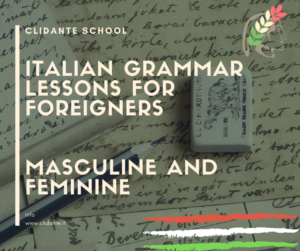Hey there, Italian language enthusiasts! Ready to dive into one of the trickiest parts of Italian grammar?
Yes, we’re talking about gender. Don’t worry , though , it’s not as scary as it sounds. Let’s start together.
The Basics: It`s All About ‘O’ and ‘A’
In Italian, we’ve got two genders: masculine and feminine. No neutral here, folks – which actually makes things a bit easier! Here’s the golden rule:
- Words ending in ‘O’ are usually masculine
- Words ending in ‘A’ are typically feminine
More Examples
– Il BambinO (maschile) – LA bambinA (femminile)
– L’ infermierE (maschile) – L’ infermierA (femminile)
– Il signorE (maschile) – LA signorA (femminile)
- L’ impiegatO (maschile) – L’ impiegatA (femminile)
– Il gattO (maschile) – LA gattA (femminile)
- Il nipotE (maschile) – LA nipote (femminile) -
Il postinO (maschile) – LA postinA (femminile)
- Il pittorE (maschile) – LA pittrice (femminile)
Easy, right? Well… mostly.
Plot Twist: The Exceptions
Of course, Italian wouldn’t be Italian without some curveballs. Some words ending in ‘O’ are feminine (like ‘mano’ – hand), and some ending in ‘A’ are masculine (like ‘poema’ – poem). Tricky, huh?
The ‘E’ Enigma
Now, what about words ending in ‘E’? Well, they’re sneaky – they can be either masculine or feminine. Your best bet? Check a dictionary or look for clues in the sentence.
Plurals: The ‘O’, ‘A’, ‘E’ Dance
Ready for some plural action? Here’s how it goes:
- ‘O’ becomes ‘I’ (sogno → sogni)
- ‘A’ becomes ‘E’ (casa → case)
- ‘E’ becomes ‘I’ (eroe → eroi)
Want to Master Italian Gender?
If you’re serious about nailing Italian grammar, why not join us at Clidante School in Rome? We’ve got a bunch of Italian courses for every level.
Can’t make it to Rome? No worries! We offer online Italian grammar lessons too.
Remember, learning Italian is a journey. Embrace the quirks, laugh at the mistakes, and before you know it, you’ll be chatting away like a local. Buona fortuna!
